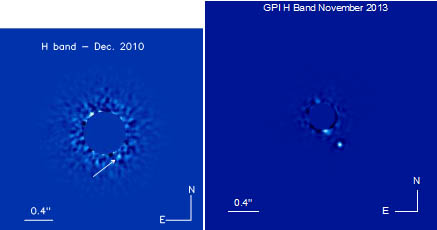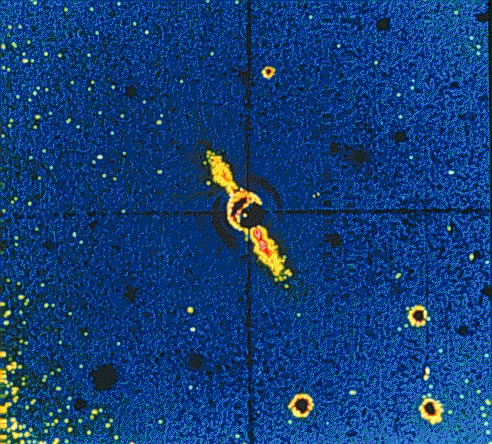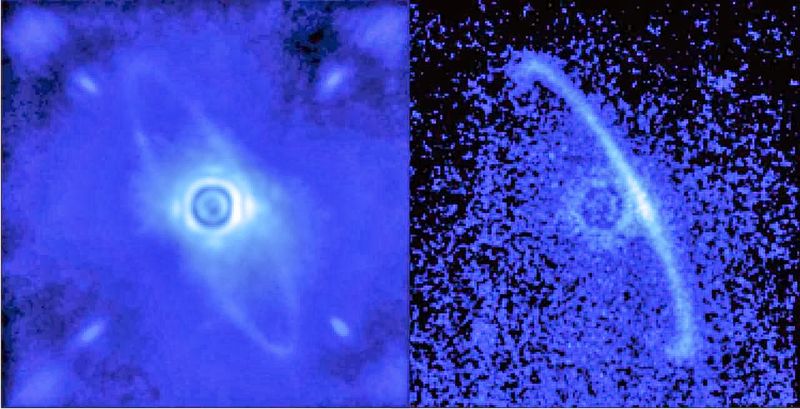It looks like you're using an Ad Blocker.
Please white-list or disable AboveTopSecret.com in your ad-blocking tool.
Thank you.
Some features of ATS will be disabled while you continue to use an ad-blocker.
6
share:
Brought to you by the same researchers who made the first cloud map of an exoplanet....
We've known the length of years of planets around other stars for some time. The different methods of discovering exoplanets yield the distance from the star in which the planet orbits and the time it takes for it to complete an orbit.
But we've never known how fast a planet an exoplanet rotates (the length of its day).
Until now..

That dot is the planet.
The planet is a gas giant which orbits the star Beta Pictoris, which has been known since the 1980s to be a young star with an accretion disk around it forming planets.
1980s image of the debris disk

Current image taken with G-PI (Gemini Planet Imager)

More here: Exoplanet's Rotation Detected for the First Time
We've known the length of years of planets around other stars for some time. The different methods of discovering exoplanets yield the distance from the star in which the planet orbits and the time it takes for it to complete an orbit.
But we've never known how fast a planet an exoplanet rotates (the length of its day).
Until now..

That dot is the planet.
The planet is a gas giant which orbits the star Beta Pictoris, which has been known since the 1980s to be a young star with an accretion disk around it forming planets.
1980s image of the debris disk

Current image taken with G-PI (Gemini Planet Imager)

Astronomers have for the first time managed to detect the rotation of an extrasolar planet, by analysing the way its atmosphere filters light. This technique could also provide clues about planet formation. Ignas Snellen and his colleagues at Leiden University in the Netherlands report in Nature that a gaseous planet orbiting the star β Pictoris rotates at 25 kilometers per second at its equator — faster than any planet in the Solar System and about 50 times faster than Earth. A day on the planet, called β Pictoris b, lasts just over eight hours, even though the planet has a diameter more than 16 times that of Earth's and carries more than 3,000 times Earth's heft.
More here: Exoplanet's Rotation Detected for the First Time
edit on 30-4-2014 by JadeStar because: (no
reason given)
edit on 30-4-2014 by JadeStar because: (no reason given)
originally posted by: Aleister
a reply to: JadeStar
Ha, when I saw the name of the thread I knew it had to be you. Great news, and another breakthrough. The beat goes on....
Yep, discoveries are being published almost daily now. It's a hot topic. (And I don't mean the gothmart - though i loved that place hahaha)
The researchers calculated the planet's rotation rate by measuring how the infrared light is filtered by carbon monoxide in its atmosphere.
At any given time, half the planet is rotating towards an Earth-based observer, so for that part of the planet's light the spectrum shifts towards bluer (shorter) wavelengths; meanwhile the other half rotates away from the observer, and shifts the spectrum of its light towards redder (longer) wavelengths. No telescope has enough resolution to distinguish the two sides of a planet, and light from the two sides combines into essentially a single pixel. But the blueshift and redshift together broaden the carbon-monoxide absorption line in its spectrum. From the amount of broadening, the team determined that at its equator, β Pictoris b rotates about twice as fast as Jupiter.
Wow, I'm impressed by the ingenuity of scientists in their quest to learn as much as we can about the universe. Articles like this deepen my already deep appreciation and respect for scientists and their work.
As this planet cools down, shrinks, and speeds up, I wonder if centrifugal forces will expell some of its atmosphere into space?
a reply to: wildespace
But will the planet speed up? I would think it would slow down as gravity from the star tugs on it for a few billion years (give or take a decade). But that's using logic - incorrect or correct as it were - and not scientific knowledge or know-how.
But will the planet speed up? I would think it would slow down as gravity from the star tugs on it for a few billion years (give or take a decade). But that's using logic - incorrect or correct as it were - and not scientific knowledge or know-how.
originally posted by: Aleister
a reply to: wildespace
But will the planet speed up? I would think it would slow down as gravity from the star tugs on it for a few billion years (give or take a decade). But that's using logic - incorrect or correct as it were - and not scientific knowledge or know-how.
I should speed up as it shrinks, due to the conservation of angular momentum. Should it definitely become tidally locked to its star? None of the planets in the Solar System are tidally locked with the Sun (although Mercury almost is).
originally posted by: wildespace
The researchers calculated the planet's rotation rate by measuring how the infrared light is filtered by carbon monoxide in its atmosphere.
At any given time, half the planet is rotating towards an Earth-based observer, so for that part of the planet's light the spectrum shifts towards bluer (shorter) wavelengths; meanwhile the other half rotates away from the observer, and shifts the spectrum of its light towards redder (longer) wavelengths. No telescope has enough resolution to distinguish the two sides of a planet, and light from the two sides combines into essentially a single pixel. But the blueshift and redshift together broaden the carbon-monoxide absorption line in its spectrum. From the amount of broadening, the team determined that at its equator, β Pictoris b rotates about twice as fast as Jupiter.
Wow, I'm impressed by the ingenuity of scientists in their quest to learn as much as we can about the universe. Articles like this deepen my already deep appreciation and respect for scientists and their work.
As this planet cools down, shrinks, and speeds up, I wonder if centrifugal forces will expell some of its atmosphere into space?
Good question.
The answer is not really, not for this planet. It's massive and its gravity counteracts such a loss that way. Now, that being said, there's the possibility that it could lose a bit of its helium through interactions with the stellar flux of Beta Pictoris.
originally posted by: Aleister
a reply to: wildespace
But will the planet speed up? I would think it would slow down as gravity from the star tugs on it for a few billion years (give or take a decade). But that's using logic - incorrect or correct as it were - and not scientific knowledge or know-how.
Ever ice skate?
When an ice skater spins and pulls their arms in they speed up. Conservation of angular momentum. Planets do the same as they begin cooling their atmosphere is pulled in.
new topics
-
Israel attacking Iran again.
Middle East Issues: 36 minutes ago -
Michigan school district cancels lesson on gender identity and pronouns after backlash
Education and Media: 40 minutes ago -
When an Angel gets his or her wings
Religion, Faith, And Theology: 1 hours ago -
Comparing the theology of Paul and Hebrews
Religion, Faith, And Theology: 2 hours ago -
Pentagon acknowledges secret UFO project, the Kona Blue program | Vargas Reports
Aliens and UFOs: 3 hours ago -
Boston Dynamics say Farewell to Atlas
Science & Technology: 3 hours ago -
I hate dreaming
Rant: 4 hours ago -
Man sets himself on fire outside Donald Trump trial
Mainstream News: 6 hours ago -
Biden says little kids flip him the bird all the time.
Politicians & People: 6 hours ago -
The Democrats Take Control the House - Look what happened while you were sleeping
US Political Madness: 6 hours ago
top topics
-
The Democrats Take Control the House - Look what happened while you were sleeping
US Political Madness: 6 hours ago, 17 flags -
In an Historic First, In N Out Burger Permanently Closes a Location
Mainstream News: 8 hours ago, 14 flags -
Biden says little kids flip him the bird all the time.
Politicians & People: 6 hours ago, 8 flags -
A man of the people
Medical Issues & Conspiracies: 14 hours ago, 8 flags -
Man sets himself on fire outside Donald Trump trial
Mainstream News: 6 hours ago, 7 flags -
Pentagon acknowledges secret UFO project, the Kona Blue program | Vargas Reports
Aliens and UFOs: 3 hours ago, 5 flags -
4 plans of US elites to defeat Russia
New World Order: 15 hours ago, 4 flags -
Sheetz facing racial discrimination lawsuit for considering criminal history in hiring
Social Issues and Civil Unrest: 6 hours ago, 3 flags -
Boston Dynamics say Farewell to Atlas
Science & Technology: 3 hours ago, 3 flags -
Are you ready for the return of Jesus Christ? Have you been cleansed by His blood?
Religion, Faith, And Theology: 11 hours ago, 3 flags
active topics
-
Israel attacking Iran again.
Middle East Issues • 12 • : RAY1990 -
The Democrats Take Control the House - Look what happened while you were sleeping
US Political Madness • 64 • : KrustyKrab -
Michigan school district cancels lesson on gender identity and pronouns after backlash
Education and Media • 4 • : TzarChasm -
Candidate TRUMP Now Has Crazy Judge JUAN MERCHAN After Him - The Stormy Daniels Hush-Money Case.
Political Conspiracies • 403 • : Threadbarer -
Cat Movies
Movies • 19 • : 5thHead -
Man sets himself on fire outside Donald Trump trial
Mainstream News • 33 • : ByeByeAmericanPie -
Pentagon acknowledges secret UFO project, the Kona Blue program | Vargas Reports
Aliens and UFOs • 6 • : Ophiuchus1 -
Israeli Missile Strikes in Iran, Explosions in Syria + Iraq
World War Three • 104 • : CCoburn -
The Acronym Game .. Pt.3
General Chit Chat • 7732 • : RAY1990 -
Are you ready for the return of Jesus Christ? Have you been cleansed by His blood?
Religion, Faith, And Theology • 20 • : RAY1990
6
